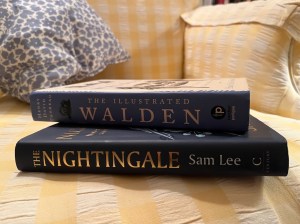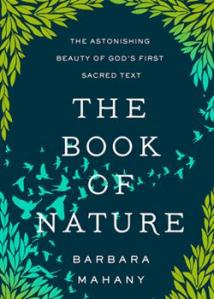forecast: more quiet
by bam
we seem to have stumbled around here onto the recalcitrant version of the red-ringed bug, the one that won’t go away. or came back before it left. i was on the mend, as was my mate here in this old house, when suddenly a cumulus nimbus of cloudy congestion came roaring back to the head of the one with whom i share these rooms. and then the little test confirmed our suspicions: it’s covid again. so he’s re-grounded and i’m shuffling quietly, still under wraps (aka mask).
which means that with a weekend forecast for snow and cold, along comes one for much more quiet. to which i let out a little yelp of muffled delight. because that means more time to dig into my latest reads: thoreau’s walden; and what could be more fitting for a january cold spree than a charming tome titled the nightingale: notes on a songbird?
and that means that once again, i’ve spent bits of my week cobbling together a few morsels for my friends who might pull up a chair.
to wit:
i begin with this beauty from henri nouwen, the modern-day mystic and deep theologian whose wisdoms are many, and whose birthday this week had me bumping into this:
Compassion asks us to go where it hurts, to enter into the places of pain, to share in brokenness, fear, confusion, and anguish. Compassion challenges us to cry out with those in misery, to mourn with those who are lonely, to weep with those in tears. Compassion requires us to be weak with the weak, vulnerable with the vulnerable, and powerless with the powerless. Compassion means full immersion in the condition of being human.
Henri Nouwen
a more beautiful definition of compassion, of being a profoundly alive human, i do not know. perhaps you’ll marinate in these holy words for a few hours this cold, cold weekend.
next up, in the wonders of the week, i found myself in a poetry conversation that spanned continents (thank you, oh wonders of zoom), and thanks to my friend Pádraig Ó Tuama, i discovered a poet whose work and whose voice i can’t get enough of. his name is dante micheaux, and what i know is that i will be chasing down his poetries in any form i might find them. here’s a bit of his bio (though i am starting to dream of a journalistic beat in which i wander the globe talking to poets, in hopes of filling out the fine grains of their stories). . .
Dante Micheaux is the author of Circus (Indolent Books, 2018) and Amorous Shepherd (Sheep Meadow Press, 2010). He holds a Master of Fine Arts in Creative Writing from New York University. His poems and translations have appeared in The American Poetry Review, Callaloo, Poetry, PN Review and Tongue—among other journals and anthologies. Micheaux’s honors include a prize in poetry from the Vera List Center for Art & Politics, the Oscar Wilde Award and fellowships from Cave Canem Foundation and The New York Times Foundation. In 2019, he won the Four Quartets Prize from the T.S. Eliot Foundation. He grew up in New Jersey, but lives now in London, and we shared a wee bit of enthusiasms for a bagel shop on Brick Lane, or as the brits would spell it, a “beigel bake.”
the judges’ citation on the Four Quartets Prize is this: “How right that this poet’s first name should be Dante. For his Circus is a Comedy: a savage comedy, lacerating dialects, fingering wounds, looking for loves right and wrong in the crevices of history and of humiliated bodes. And yet, and yet. His language exults, triumphs, and freely rummages in the treasuries of the Bible, Baudelaire, Whitman, Eliot, Baraka, and Mahalia Jackson, taking what it needs, making it his sovereign own, a wrested blessing. Congratulations, Dante Micheaux, on your astonishing Circus.”
you can hear a bit of him here, in a podcast called beyond the red door, an audio companion to a poetry series that brings poetic meditation inside the walls of St Mark’s, an Anglican church in Jackson Heights, in New York City. Here, Micheaux is in conversation with Anglican priest and poet, Father Spencer Reece (himself a whole nother story). Micheaux reads a poem reminiscient of Tony Morrison’s The Bluest Eye, and at the end a Canto …
(i’m promising more on Spencer Reece next week, as i’ve requested a slew of his books from the library…) and here is but one of dante’s poems that took my breath away…
Mary at the Torture
Everyone was out that day, for a show.
Sure, it was sad for people who knew him
but she was his mother, slinking about
the rabble in that dark halug, veiling
her face with a headscarf—as if no one noticed her.
Some say it served her right,
letting her son run about the countryside
the way she did. Poor Joseph,
for all efforts at teaching the boy
a skill, never succeeded,
hadn’t a chance against Mary’s coddling.
But how could she just stand there, watching?
Each time the scourge met flesh she didn’t even flinch.
No cry, no lamentation—most unlike a child of God.
Any other mother would have had to be contained,
would have put herself between lash and child,
would have succumbed to conniption—at the least,
rent her clothing. Not one tear.
She was always strange, though—quiet,
dark days about her since she was a girl.
It wasn’t easy: the scandal before the wedding;
him getting into trouble with the law.
Perhaps, she was relieved.
–Dante Micheaux
(first published May 11, 2011, in Painted Bride Quarterly)
the techno team here at the chair is figuring out how to host a virtual launch of my soon-to-be book, The Book of Nature: The Astonishing Beauty of God’s First Sacred Text (which got its very first official review this week, in Booklist, a publication of the American Library Association, and which you can find over on Book of Nature’s very own page here at the chair. details and sign-up soon as the techno wizards figure it out. and yesterday, in a meeting with the lovely team who does the heavy lifting in the book-peddling department, someone held up an actual hot-off-the-presses copy of said book, proving its existence, and alerting me to the notion that it could soon be landing with a plop on my snow-covered stoop. (though it’s official pub date is still firmly on the vernal equinox, march 21, 2023)
before closing, a wee bit about the two books waiting on my butter-yellow-checked chair: thoreau’s walden i am reading cover to cover as preamble to the weeks ahead when i’ll likely be extolling the wonders of keen-eyed watchkeeping on the woods and the turning of seasons.
sam lee’s the nightingale has been on my bedside table for at least a year (there’s a whole essay on the books we keep close at hand, yet never manage to crack). for the pure whimsy of it (as well as a fine excuse to read the pages of the irish news) here’s what they have to say about the wondrous love-letter to the vanishing bird. but should you refrain from clicking, here’s the book jacket description:
Come to the forest, sit by the fireside and listen to intoxicating song, as Sam Lee tells the story of the nightingale. Every year, as darkness falls upon woodlands, the nightingale heralds the arrival of Spring.
Throughout history, its sweet song has inspired musicians, writers and artists around the world, from Germany, France and Italy to Greece, Ukraine and Korea. Here, passionate conservationist, renowned musician and folk expert Sam Lee tells the story of the nightingale. This book reveals in beautiful detail the bird’s song, habitat, characteristics and migration patterns, as well as the environmental issues that threaten its livelihood.
From Greek mythology to John Keats, to Persian poetry and ‘A Nightingale Sang in Berkeley Square’, Lee delves into the various ways we have celebrated the nightingale through traditions, folklore, music, literature, from ancient history to the present day. The Nightingale is a unique and lyrical portrait of a famed yet elusive songbird. Sam Lee has brought the poetic magic that has long enchanted so many of his musical fans into the written word.
and that’s the news, thin as it is, from here at covid central.
how shall you be soaking in your quiet hours ahead?





Oh th
1) that Dante poem…holy mother of God, as they say…
2) hope your book thumps onto my doorstep early also!
3) oh SNAP about more covid! Bah!
And that has to be the coziest reading nook evah…
it’s especially cozy when i pile myself with blankets upon blankets. and with the snow lulling down out my windows…..
AMEN to that, non!!!?!?!?!? i swear i was orbiting around the room yesterday, reading him, listening to him, drinking him in…….that poem makes me weep…..
I’m going to order a copy of The Nightingale: Notes on a Songbird. It sounds wonderful—thank you for the recommendation! The Illustrated Walden happens to be one of the most cherished books on my shelf. It’s a treasure! Please get well soon, both of you, but in the meantime, enjoy your quiet book-filled winter nest! xx
i cannot tell you how many bazillion times i have thought of you when picking up that book. it has your name scrawled on every page, and i am so sorry it’s taken me so long to mention it here. as a girl with a nightingale heart (and voice) yourself, i think you’ll be enchanted from the start. the author is a folk singer who set out, anthropologically, to gather up and record all the disappearing folk songs across europe. and blessed be, the nightingale’s was one. he now brings groups into the woods to serenade with and to the nightingale…….!!!
Oh th
Internet Gremlins strike again! So “Oh th…?” should be
Oh that darn burning red ring of fire…may it be easily extinguished. In the meantime, thank you for sharing songbirds and writers, especially Dante’s words. It is an interesting man who disrupts the myth making of the patriarchy when it comes to Mary, woman and mother. It did bring to mind Colm Toibin’s The Testament Of Mary which is short novel and also a play, both a worthwhile read by another “disrupter”.
I am sorry you are still captive to Covid, but we certainly are lucky to share in your captive contemplations! ♥️
i’m the lucky one that you don’t mind the captive contemplations. it is the purest joy to me to find these little marvels of wonder strewn across my winding ways, and to bring them here. where there are sooo many kindred souls. and i so prefer sharing the wisdoms of others to the drone of my own. it’s a way to keep the table aplenty without filling the air with just noise from my windbags. (i can delete your gremlin comment above if you’d like. just click your fingers and it shall be done!) xox fascinating comment on the disrupters…..
The passage from Henri Nouen felt like a secret message to my heart today. The day was made a lot easier because I read that this morning. So sorry about the Covid blues at your house. Hope next week is better.
Makes me sooo happy to know you heard a secret message. Bless you. ❤️❤️
The photo of your reading nest is so lovely and cozy. Belongs in a home decor magazine! I think though, that I was more comfortable with the photos of that same chair surrounded by teetering stacks of books when you were in process of writing your Nature book! So sad to hear that there is illness in your home again – Grrrrrr! Happy healing, all!
ha!!! yes, perhaps the floors are calling out for their literary companions. it seems i might be on my way to providing, as the shelves are groaning again. though i have upped my library borrowings and now try not to buy until i’ve read from the library and deem it a “must-have.” the best part of that chair is that it fits me perfectly when i curl into it……
Sorry to hear that covid has become the unwelcome guest once again. But, oh that cozy reading arrangement. You had me at:
which means that with a weekend forecast for snow and cold, along comes one for much more quiet. to which i let out a little yelp of muffled delight.
My reaction exactly when I heard about the weather prediction for this weekend. Although my solitude of choice is knitting and that chair would work equally as well for that. 🙂
Looking forward to your book release. Until then, enjoy your quiet.
hello beautiful D! knitting sounds perfectly lovely too! i have tried so many times to knit, knowing i would love the rhythms, and being the daughter of a knitter. but my fingers fumble every time! the fat falling snowflakes are sooooo beautiful up here. i can’t take my nose away from the window….
What a wonderful wealth of information this week, Barbie! I went to Beyond the Red Door and was enchanted by both men as I listened to their work. Then I read a bit of Sam Lee’s book and found this hopeful passage: ” If it is true that the human modification of landscapes along our primordial migratory routes produced landscapes in which, until recently at least, the nightingale could flourish-then this symbiosis might provide a benevolent model for our relationship with the wild. It’s one we might want to resurrect. “ And speaking of our relationship with nature, I’m so excited that your upcoming book made the Englewood Review of Books top ten list! In addition, the first official review of it by Booklist is terrific! You go girl-so much to be proud of! On the home front, glad you’re feeling better, and prayers for Blair’s quick and complete recovery!❤️
goodness gracious, you burrowed in!!! delighted that you followed all those trails. i’ve been reading Spencer Reece’s memoir (all afternoon yesterday) and i am blown away. how can there be so much genius in this world, and we discover so little of it. my quest continues. thanks for leaping into the adventure. xoxox